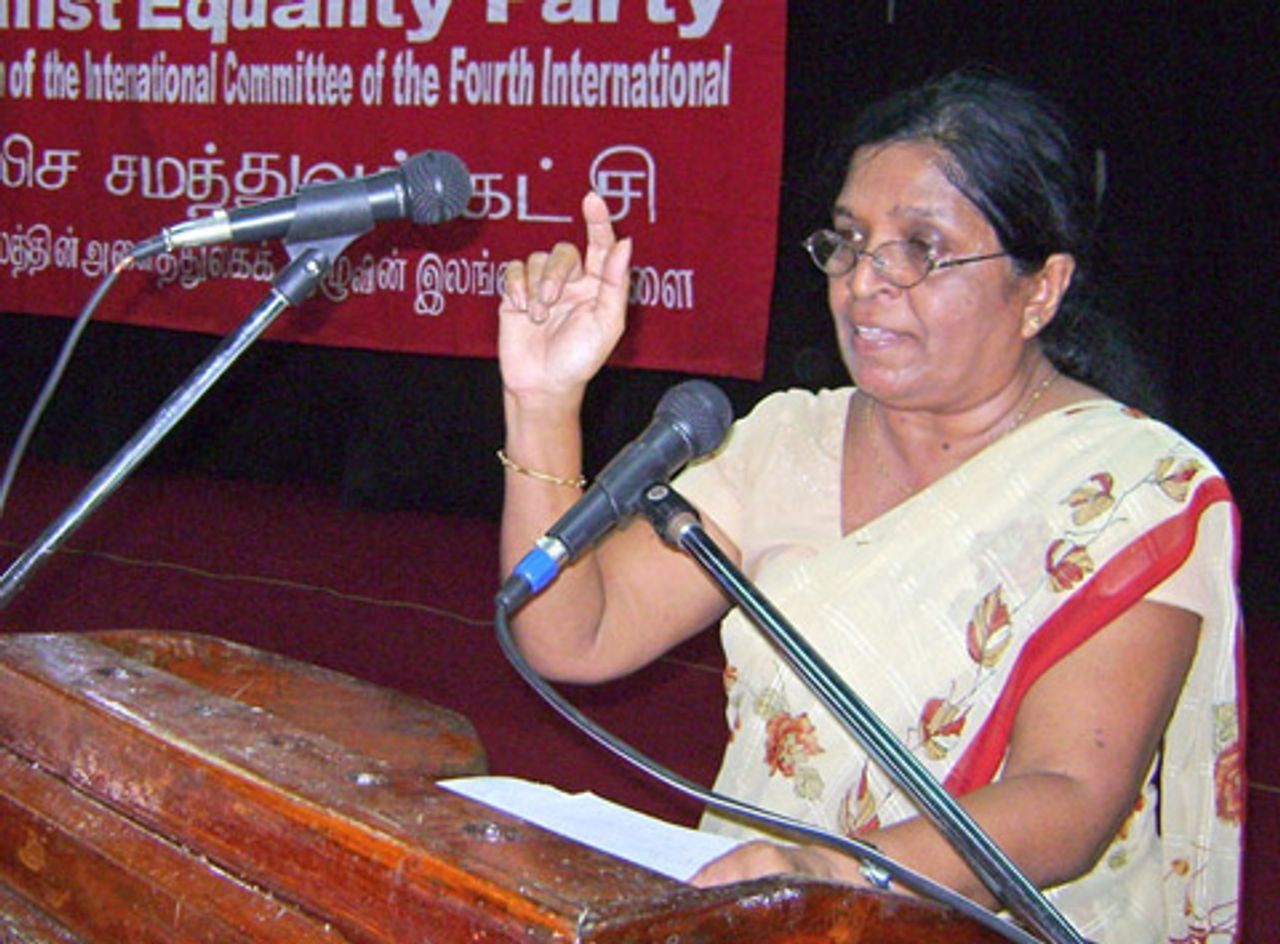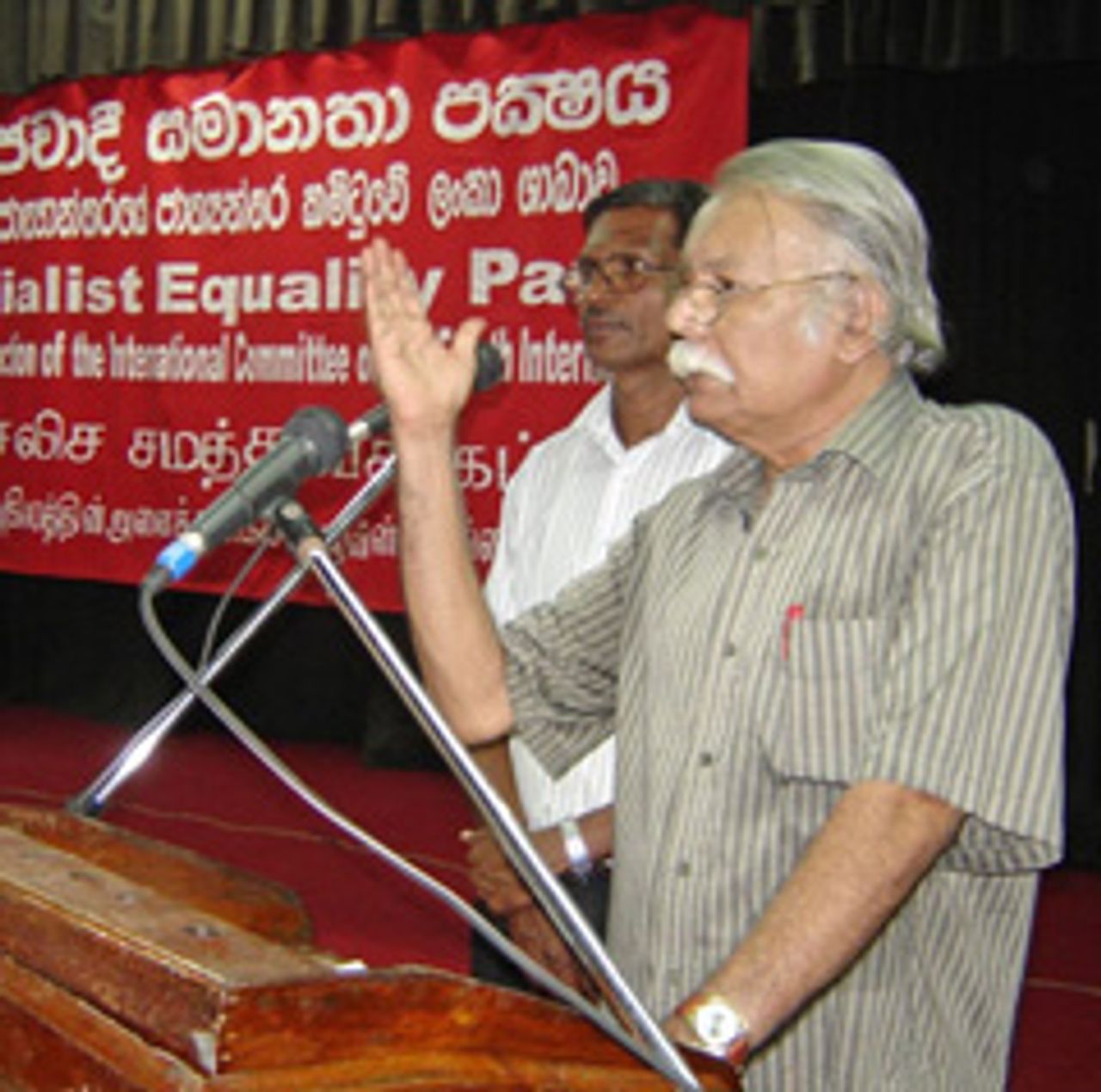The Socialist Equality Party (SEP) in Sri Lanka launched its campaign for the April 8 general elections with a public meeting at the Public Library Auditorium in Colombo on March 5. The SEP is running 58 candidates in slates for four districts—the capital Colombo, Jaffna in the war-torn north, Nuwara Eliya in the plantation areas and Galle in the south. About 100 workers, students and professionals participated in the meeting.
Before the meeting, members and supporters of the SEP and the International Students for Social Equality (ISSE) campaigned in the residential areas and universities in Colombo to discuss the party’s program with workers and youths. In Wellawatta, a Tamil majority area in the city, a team discussed with students the failure of Tamil parties to defend basic democratic rights. At Colombo University, students explained their lack of basic facilities like hostels, and their distrust of the existing student leaderships.
 Vilani Peiris
Vilani PeirisSEP Political Committee member Vilani Peiris, who heads the party’s slate for the Colombo district, chaired the public meeting. SEP general secretary Wije Dias delivered the main speech, while Kapila Fernando spoke on behalf of the ISSE.
Opening the meeting, Peiris explained that the party’s main aim in the election was to discuss a socialist alternative to the deep political crisis in Sri Lanka. “President Mahinda Rajapakse and his United Peoples Freedom Alliance (UPFA) are seeking a two-thirds majority in the parliament. Their purpose is not to strengthen democracy but to strengthen the government’s hands to intensify its attacks on living conditions and implement further police-state measures.” She warned the government’s autocratic methods of rule used during the war against the separatist Liberation Tigers of Tamil Eelam (LTTE) would be turned against the working class as a whole.
Dealing with the role of the opposition parties, Peiris said: “The alliance between the United National Party (UNP) and the Janatha Vimukthi Peramuna (JVP) in backing former army commander General Sarath Fonseka as a ‘common candidate’ in the presidential elections has now collapsed. They are contesting separately. But these parties have no fundamental differences with the Rajapakse government.”
Peiris continued: “The JVP is contesting under Fonseka’s leadership as the Democratic National Alliance. JVP secretary Tilwin Silva said its aim is to build a broad alliance to restore democracy. This is a lie. The JVP has a notorious history of attacking and murdering political opponents and supporting the civil war. It supported Rajapakse’s bid for power in the 2005 presidential election and shares political responsibility for the government’s attacks. Having been discredited among ordinary people, it is now in a reactionary alliance with the former army commander who prosecuted the war.”
 Wije Dias speaking
Wije Dias speakingIn his address, Dias explained that the SEP is the only party presenting a genuine alternative for the working class. “We fight for a workers’ and farmers’ government based on socialist policies to replace this government. That is our central demarcation from all the other parties.” He warned that Rajapakse and the Central Bank were seeking to chloroform the population by claiming to be making Sri Lanka’s economy “the emerging wonder of Asia”.
“The global economic crisis has reached a new stage, as indicated by what is happening in Greece. This follows the world financial turmoil, which began in September 2008 in the form of a collapse of gigantic global financial institutions. The bailout of the major private banks and financial institutions by governments, using public funds, has led to the danger of state bankruptcy. The debt situation in Sri Lanka is no different to that faced by Greece, and it has been exacerbated by the huge debts incurred for the civil war,” he said.
Dias pointed to the public debt in Sri Lanka, now exceeding 4 trillion rupees or 90 percent of the Gross Domestic Product, the net outflow of foreign investment and the International Monetary Fund’s suspension of the third installment of last year’s $US2.6 billion loan to Sri Lanka. “Under these conditions, the government will be forced to further intensify attacks on living conditions. Although these attacks have been postponed temporarily because of the election, they will be carried out with unprecedented intensity after April.”
Explaining how the living conditions of working people and the rural toilers have been eroded substantially already, Dias referred to a recent Central Bank report. It stated that the main reason for the rise in the cost of living is escalating education and health expenses. Dias said successive governments have eroded the free public education and opened the way for private operators.
The speaker pointed to the historic content of that reversal. “Free education and health services were social rights won by working people under the Trotskyist leadership of the Lanka Sama Samaja Party during its revolutionary days before it politically capitulated to capitalist rule by joining the government of Madam Sirima Bandaranaike in 1964.”
Dias opposed the role of the trade union leaderships in suppressing all workers’ struggles, on the pretext that elections were underway. By contrast, he said, “the working class must use this election time to initiate independent struggles for its demands”. The SEP would intensify its campaign during and after the election for independent action committees of workers to defend basic conditions and fight the betrayals of the unions.
The speaker reviewed the opportunist politics of the ex-left radical groups, like the Nava Sama Samaja Party (NSSP) and United Socialist Party, which were utterly hostile toward any struggle for the political independence of the working class. He said that NSSP leader Wickramabahu Karunaratne has emerged as a main spokesman for the bourgeois program of Tamil separatism, forming a “Left Liberation Front” with two ex-MPs who broke from the Tamil National Alliance, which acted as a mouthpiece of the LTTE until its military defeat last May.
Dias emphasised: “In opposition to this type of divisive politics, the SEP stands for the unity of the working class in Sri Lanka, South Asia and internationally, cutting across all communal divisions. The social problems faced by the masses can be solved only by the working class taking state power, rallying the support of oppressed masses.”
Dias concluded by appealing to the audience to join the SEP election campaign to build support for its program and perspective of socialist internationalism among working people and the oppressed masses.
In an interview after the meeting, Kumarasena, a printer from the southern city of Matara, told the WSWS: “I was searching for an alternative for all other political parties. I saw the posters of this meeting. Its heading was somewhat different. It is an appeal for a workers’ and peasants’ government. I watched Wije Dias’s speeches on television [during the presidential elections] and I was interested in that.
“People cannot bear the present living conditions. Actually I was wondering, ‘How did Rajapakse and his government win the elections, even though they assaulted the living conditions and other rights of people?’ Now I know from your speakers that there is no alternative program being offered by the other parties.”
